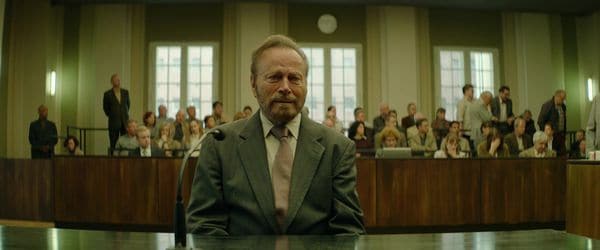



Dir.: Marco Kreuzpaintner; Cast: Elyas M’Barek, Alexandria Maria Lara, Franco Nero, Heiner Lauterbach, Manfred Zapatka, Jannis Niewöhner, Catrin Striebeck, Peter Prager; Germany 2019, 123 min.
A gripping courtroom drama based on a real events sees a modest man tried for a motiveless murder.
Even today war crimes are still being committed all over the world. German director Marco Kreuzpaintner‘s feature serves as a timely reminder of the Dreher Law that allowed many war criminals to get off by a technicality.
Inspired by Ferdinand con Schirach’s bestseller of the same name and adapted by Christian Zübot, Robert Gold and Jens-Friedrich Otto, The Collini Case brought the scandal to the international stage. It’s an impressive undertaking that rather overstays its welcome despite Franco Nero’s engaging performance as defendant Franco Collini.
It maintains that the German justice system and the majority of politicians wilfully obstructed the persecution of war criminals, in the majority members of the Waffen SS.
Lawyer Caspar Leinen (M’ Barek) is appointed by the court to defend Fabrizio Collini (Nero), who has killed the German industrialist Hans Meyer (Zapatka) with three shots to the head. Collini is not willing to defend himself, and refuses to talk to Leinen, whose mother was Turkish, and was abandoned by his father (Prager) when Caspar was two.
Leinen is inexperienced in court dealings and his position is not helped by his close ties to the Meyer family: Meyer senior has financed his studies and treated him like a son and he has been enjoying an affair with Meyer’s grand daughter Johanna (Lara). Flashbacks flesh out how Leinen’s relationship with the influential Meyer family ended after several members of were killed in gruesome car accident, and bring to light Meyer’s senior’s controversial past: he was a member of the Waffen SS and responsible for a massacre in Montecatino when he saved little Fabrizio from being shot as a hostage. instead the child had to watch his father being killed, with Meyer ending his life in a coupe de grace.
In 1969 Fabrizio and his family filed a law suit against Meyer, but were then told that the German parliament had adopted the so-called Dreher law, which meant that all German war criminals were guilty of Murder Two – in other words the statue of limitation run out after twenty years, whilst Murder One had no time limit for prosecution.
In tense but protracted court scenes Lenien is locked in a battle of wits with his mentor the Public Prosecutor Prof. Mattinger (Lauterbach) part of a committee which formulated the Dreher law.
Although some may consider the flashbacks self indulgent, distracting from the central narrative. DoP Jacub Bejnarowicz does a brilliant job of enlivening the court proceedings with his visualisation of a contemporary Berlin still full of reminders of a murderous past. But his flashback images are rather on the kitsch side. Franco shines in a central tour de force but the support cast is not always convincing. Somehow there is too much pathos, partly due to the script.
The Collini Case needed a touch of irony to lighten its ever-relevant themes: But despite its worthwhile and ever-relevant themes of corruption, judiciary ethics, and toxic masculinity. Nero adds allure in a film marred by a rather stuffy support cast, the whole ensemble resembling a fighting unit, ready to attack rather than engage. AS
IN CINEMAS 10 September 2021